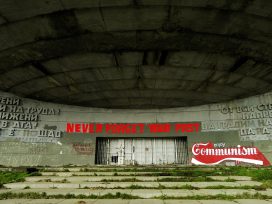Poland, 1988: Jan Grzebski, a railway worker, sustains a head injury while coupling train carriages. The accident leaves him comatose, and doctors give him perhaps three years to live. Nineteen years later, he awakes in a world he does not recognise. “When I went into a coma there was only tea and vinegar in the shops, meat was rationed and huge petrol queues were everywhere,” he recently told Polish television. “Now I see people on the streets with mobile phones and there are so many goods in the shops it makes my head spin.”
Grzebski’s story is interesting because it reminds us just how profoundly Polish society has changed during his “absence” of nearly two decades. Under communism, and particularly throughout the economic crisis of the 1980s, many of the things that we in Britain already took for granted remained unavailable to the Polish people; the state-owned shops lacked even the most basic of staples, and the population was largely denied access to the luxuries of western consumer society. To acquire a car, or a flat, would typically entail a waiting list of several years.
But in 1989, just one year after Grzebski’s accident, a landslide victory for the recently legalised Solidarity party in the Parliamentary General Elections made Poland the first state in the Eastern Bloc to overthrow communist rule. This political revolution facilitated major economic reform, and since the early nineties, Poland has steadfastly pursued a policy of liberalizing its economy, making the transition from a state-directed to privately owned market economy. Despite subsequent growth, however, there remain significant problems; decades of unwieldy economic structures operated under a tight central command have made Poland slow to put into practice the tenets of Western democracy – politically, economically, and socially.
The parting of the Iron Curtain has had fundamental implications for the shaping of Poland’s national character, and as Grzebski’s unique case demonstrates, assuming a new way of life is a complex process. For those who remember the communist era (and for the one man who remembers nothing but), adjusting to this new mentality has proved difficult and sometimes bewildering. In the last century, Poland has experienced myriad shifts: geographic (in the form of border changes), political (foreign domination, regime change), and demographic (ethnic cleansing and migration). Today, Poland is embroiled in a crisis of identity. Geographically situated between Eastern Europe and the West, and culturally between the Old World and the New, it is a country ambivalent in its political affiliations, economic stability and social values. Its people are divided – between this older, conservative generation, whose habits were formed in years of poverty and hardship, and the younger, increasingly exposed to a consumerist mentality that permeates every aspect of life, and which instils a new set of values – and possibilities of “elsewhere”.
The temptation to go elsewhere predates the dismantling of communism, however. In the 1970s, many family income providers travelled for work in Western Europe, particularly West Germany, to escape the constant economic and political pressures and the general sense of hopelessness. During this era hundreds of thousands of Poles left the country permanently and settled in the West, so that by the mid 1980s, Poland had become the major migrant sending country in Europe.
Recent developments have galvanised this exodus still further. In May 2004, Poland was granted accession to the European Union, and Polish people the right to work in other EU countries. With the highest rate of unemployment in Europe (11.8% in February of this year), and the prospect of better wages to be earned abroad, many Poles have exercised this right. While France and Germany put in place controls to curb Eastern European migration, the United Kingdom has not imposed such restrictions, and has, unsurprisingly, become the most popular destination in Western Europe for migrant workers. The British Home Office originally anticipated an inflow of 5,000 to 13,000 people a year, but by the end of 2005, according to Home Office statistics, 204,895 Poles had registered to work in the UK and pay tax. The number of unregistered Poles working in the shadow economy is probably as large. In Scotland, it is estimated that there are around 86,000 Poles, almost three times the official figures, with the highest concentration in the Lothians, where there are believed to be more than 35,000 Polish people living and working, with around 20,000 of those based in Edinburgh. Though exact figures would be impossible to establish, the Polish contingent in Britain now undoubtedly comprises a significant minority.
Most Poles do low-paid jobs in catering, agriculture and construction, as exemplified by the stereotypical “Polish plumber”. 80% of these workers earn £6 per hour, little more than the British minimum wage, but approximately four times what they could expect to earn in Poland. The financial benefits of working in Britain are not, however, the only incentive to come here. There appears to be, among more educated Poles at least, a belief that emigration from Poland is motivated not only by fiscal need but the social perception of work there; that there is a pathological dimension to the Polish cultural mentality that does not reward the worker with sufficient respect for his endeavours. The consequence of this is that Poles are attracted to societies in which a more established meritocracy operates. That is, societies in which wealth, position, and social status are in part – and in theory, at least – assigned through competition or demonstrated talent and competence. Over 4,000 doctors have come from Poland to the United Kingdom in the last three years, attracted not only by the higher earning potential, but the greater social value they perceive to be attributed to their work, and the opportunities for advancement. The attitude still prevalent in Polish society is at odds with the imported democratic capitalist ideology: a hangover from the communist era, which does not celebrate the flourishing individual.
An individualist ethic is perhaps the inevitable consequence of a capitalist system, or more accurately, a combination of neo-liberal economics and the belief, as disseminated by the mass media, of material consumption as the route to and proof of happiness. Nowhere is this symbiotic relationship between economic policy and social ideology better exemplified than in the United States, where the democratic virtues of individualism have been embedded in the national ideology since its inception, and material abundance has facilitated its realization. But in post-war Britain also, a culture has emerged that emphasizes the importance of the individual’s wants over the social networks in which he or she operates, effectively eliminating the concept of the “public good” (which hinges upon a policy of generalised reciprocity and community engagement), and towards a code of behaviour that engenders little, if any, obligation beyond the self. This culture has contributed to the erosion of social connectedness, and the devaluation of a currency which cannot be expressed or exchanged in financial terms – what sociologists call “social capital”.
The term refers to the notion that social networks have a collective value, and that an individual will benefit from a concern for, and participation in, his or her community. Social capital comprises a set of attitudes and mental dispositions that favour co-operation within society, and equals, to put it simply, the “spirit of community”. It can be seen as a resource, but unlike other forms of capital, is depleted not through use, but rather, from non-use. Social capital is maintained, or accumulated, through active civic engagement and social trust. Roger Sapsford and Pamela Abbott, in their study Trust, Confidence and Social Environment in Post-Communist Societies observe:
Trust is both a “feeling” and a “cognitive state”: a feeling of confidence in those around you and/or in things unseen, but also the perception of socioeconomic systems, and relations as regularities on which one may depend. Trust is cultural, normative and deeply embedded in socially shared understandings […] Simmel […] points to the importance of a priori trust – the trust we are socialised into and bring to each relationship – and talks of a reciprocal orientation of people to each other, a concern for others at the root of social interaction, something implicitly presupposed in social organisation.
Traditionally an agrarian, socially conservative, catholic country, emphasis on individual success and its material substantiation has never been a feature of the prevailing ideology in Poland. And while much has been said about the stifling effects of the post-war communist institutional heritage, we might also consider some of the social virtues preserved by the regime. Christoph Bühler and Ewa Fratczak, in a study entitled Social Capital and Fertility Intentions: The Case of Poland argue the following:
Network related help and support is a distinctive mark of Poland as well as of many other Central and Eastern European countries. It has its roots in pre-communist times (Sik, 1995). Due to an underdeveloped infrastructure, a low standard of living, and people’s orientation towards household and kinship, mutual help and support was a common strategy of coping and getting things done at the beginning of the 20th century. This was also the case during socialism. Because of the malfunctions of the command economy and state bureaucracy clientilism, social networks were an important source of resources. In view of the perceived and considerable ineffectiveness of the system of public institutions under socialism, social networks played a basic role in determining opportunities to reach individual goals.
In other words, Poles have long recognized the importance of social connectedness, and have emphasized the resources available to an individual through active community participation. There exists still in Poland a notion of the public good – what Alexis de Tocqueville termed “self-interest rightly understood”. One need only venture onto the street in any Polish town or city to see how this is manifest: in the proliferation of small, independent businesses, where the social exchange is equivalent to the material transaction taking place. The traditional bar mleczny or “milk bar”, for example, provides meals that are cheap, nutritious, and readily available to everyone. Consequently, they are popular among the elderly, pensioners, homeless, but also students or university professors, thereby strengthening bonds across the social demographic. As one Polish journalist writes, “To many, [the milk bar] evokes nostalgic memories of those difficult days when people had to tackle difficult social and political problems because of the perverse system then in force but displayed great courage and solidarity in doing so.” Though relics of a departed system, milk bars continue to provide a vital social function – this sense of solidarity – and encouragingly, these institutions still outnumber outlets of global fast food chains motivated solely by profit.
We in Britain have not altogether forgotten the importance of independent enterprise; there exist still some important repositories of social capital in our culture. The “greasy spoon” is perhaps our equivalent of the Polish milk bar, offering unpretentious food at low cost, and attracting an equally varied clientele. But perhaps nowhere in our culture is social capital better preserved, or so eccentrically emphasised, than in our second-hand bookshops. Unique in their seemingly indifferent attitude towards commercial conventions, second-hand bookshops celebrate obscurity, diversity, and a shared cultural heritage, chronicling centuries of thought that might otherwise be forgotten. Virginia Woolf identified just these qualities possessed by our second-hand bookshops, in an essay entitled Street Haunting:
Here we find anchorage in these thwarting currents of being; here we balance ourselves after the splendours and miseries of the streets […] Books are everywhere; and always the same sense of adventure fills us. Secondhand books are wild books, homeless books; they have come together in vast flocks of variegated feather, and have a charm which the domesticated volumes of the library lack. Besides, in this random miscellaneous company we may rub against some complete stranger who will, with luck, turn into the best friend we have in the world. There is always a hope, as we reach down some greyishwhite book from an upper shelf, directed by its air of shabbiness and desertion, of meeting here with a man who set out on horseback over a hundred years ago to explore the woollen market in the Midlands and Wales; an unknown traveller, who stayed at inns, drank his pint, noted pretty girls and serious customs, wrote it all down stiffly, laboriously for sheer love of it (the book was published at his own expense); was infinitely prosy, busy, and matteroffact, and so let flow in without his knowing it the very scent of hollyhocks and the hay together with such a portrait of himself as gives him forever a seat in the warm corner of the mind’s inglenook. One may buy him for eighteen pence now. He is marked three and sixpence, but the bookseller […] seeing how shabby the covers are and how long the book has stood there since it was bought at some sale of a gentleman’s library in Suffolk, will let it go at that.
Christopher Morley, the American journalist, gave similar reverence to bookshops. He was a great advocate for independent booksellers as public servants. The shops they ran, he said, afforded one pastimes as well as the chance to discover the “bread and meat of life”. Edinburgh is home to more of these eclectic stores of knowledge than any other city in Scotland, and looking around the city’s bookshops today, it is interesting to note the frequency with which they offer sanctuary to European itinerants: often their clientele, and sometimes their staff, comprise as diverse a quilt of ethnicity as the authors displayed on the shelves. Perhaps for those people arriving here from abroad, our second-hand bookshops, and other independent enterprises, in their quiet resistance of corporate homogenisation and bureaucratic protocol, offer some reminder of home.
Even in the most developed urban centres of Poland, corporate presence is strikingly lower than that in Britain. In Scotland particularly, there is a growing “Tesco town” phenomenon. Inverness became the subject of a national controversy last year when the supermarket giant announced plans to open its fourth store there. Already having contributed to the closure of about 20 small shops in the city centre, and having gained a 51% share of the market for groceries, this constituted the highest rate of supermarket penetration for any locality in the UK, and many local residents were understandably incensed about the damage that had evidently been done to their community. The new wave of Polish immigration into Britain has done something to curb the trend of corporate monopolization in our culture. In Edinburgh, for example, we now have a vibrant Polish community, concentrated around Leith Walk and Easter Road, where Polish-run grocery shops, restaurants and delicatessens are thriving. Wander through Tollcross late at night and one is now often treated to a sensory experience that has practically disappeared from British culture – the smell of fresh bread, baked on the premises at the Pine Tree Bakery, run by a Polish family. Here, Morley’s “bread of life” takes literal form, and we begin to see what we have been missing.
The Polish presence in Britain is an example to us – of what we have already lost, and what we should perhaps try to preserve. In our increasingly consumerist culture, we have embraced a spurious ideology of individualism – to the detriment of our collective wellbeing. This ideology is malignant, and spreading now through Europe, has taken root in Poland. “What amazes me today,” said Grzebski, trying to make sense of this new mentality, “is all these people who walk around with their mobile phones and never stop moaning.”






